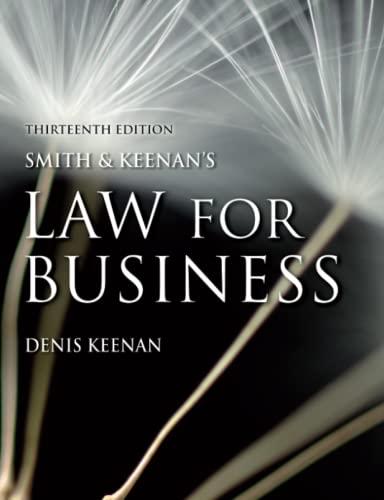Question
Many businesses today, as corporate entities other than sole proprietorships, voice their political and social views in various ways. Voicing a view is not the
Many businesses today, as corporate entities other than sole proprietorships, voice their political and social views in various ways. Voicing a view is not the issue. How business is conducted, ethically and lawfully, for a secular business purpose is the focus.
The subject of LGBTQ+ rights is an evolving constitutional issue for business. The Supreme Court has sent mixed messages, and in June, 2023, further muddied the line between a business' allegation of protected "speech" versus illegal discrimination, at least when it relates to LGBTQ+ members of the public.
The fundamental concept enabling a business to operate is the Commerce Clause of the U.S. Constitution. Let's start there.
Commerce is conducted in the public marketplace, which today encompasses a global internet as well as the street past your house or apartment building to the corner store.
Businesses do not operate in a vacuum. They are enabled by public community support in such infrastructure as utilities, roads, transport, safety and fire services, the internet service providers (part of utilities in one way or another), supply chain, and a plethora of other goods and services upon which a business and its owners rely to operate.
Unless a business by definition is serving only a limited clientele, (e.g. one church, a private club, a closed customer group), it is open to the public to whom it offers its wares or services. The business has a lot of freedom, and should have, but there are limits: cannot trade in illegal products or services; cannot operate at a location against zoning regs; cannot disturb the peace, dump toxic waste, encroach on other properties --- you begin to get the picture. A restaurant can have dress rules - men must wear jackets and ties is an example. But that would be all men. Should it be OK to exclude African American men only, or Asians, and so forth? What is good for business? What is fair to the public?
And that brings us to the LGBTQ+ issue and the topic of "business rights" for this Discussion.
In your Week 3 Lesson readings is the June 30, 2023 Case decided by the U.S. Supreme Court allowing a website designer to refuse her design service to same-sex weddings. The case states the website owner - a business - has the constitutional right to refuse under the First Amendment Freedom of Speech. Freedom of religion is also implicated, because she links her refusal to her Christian belief against gay marriage.
It is noteworthy that previously the Court has recognized gay marriage and has recognized homosexual identity is protected as gender within the meaning of the federal Civil Rights Act.
DISCUSS:
How does the Court find the 1st Amendment supports the web designer's position. What is the 303 Creative, LLC case's significance for business - any business?
Also consider these questions in forming your essay. (Do not "list answers;" - Use these questions to help your thinking in creating a thoughtful response.) Have gender identity, race, ethnicity, and other protected classifications now ceased to be a "compelling governmental interest" by edict of the U.S. Supreme Court in this one case? Do you agree with the Court's decision for the web designer as to businesses serving the public? Is there a limit to saying "no" to a customer who differs from your personal belief? Does this case now give businesses a license to refuse anyone who has a different religious belief, or skin color, or gender identity, for example? Suppose, in the wedding context, it is not a LGBTQ+ couple's wedding but a Jewish wedding? Islamic? Pagan? Biracial?
For some context here are 2 more earlier cases on this issue from the Court:
Arlene's Flowers Case - SCT of WA (U.S. Supreme Court refused to hear the case)
Masterpiece Cakeshop - SCt US opinion
https://www.glad.org/cases/deboer-v-snyder/
https://www.oyez.org/cases/2019/17-1618
Step by Step Solution
There are 3 Steps involved in it
Step: 1

Get Instant Access to Expert-Tailored Solutions
See step-by-step solutions with expert insights and AI powered tools for academic success
Step: 2

Step: 3

Ace Your Homework with AI
Get the answers you need in no time with our AI-driven, step-by-step assistance
Get Started


